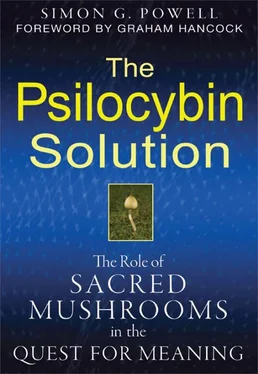Clearly, the average neo-Darwinist alleges that the evolutionary process is not intelligent. Yet life is undeniably more complex, organized, integrated, and smart than we can possibly grasp. Indeed, science, especially biological and genetic science, is still coming to grips with the elaborate complexity of living systems. It seems that the more closely science examines life, the more ingenious life turns out to be, as if there is little that evolution cannot achieve. Evolution through natural selection undoubtedly happens, yet how we interpret the meaning of natural is not necessarily a foregone conclusion. To suggest that natural selection represents a manifestation of natural intelligence is merely a new way of evaluating the reality of evolution in the light of contextual considerations. No new supernatural mechanism is being invoked—rather we are reinterpreting and reappraising the facts at hand.
Have We Stolen Nature’s Glory?
Scientific discoveries, whether in biology, chemistry, neuropsychology, or physics, invariably point to the ingenuity of Nature. Every university science department in the world owes its existence to the smartness of Nature—a smartness that science merely reflects. Almost every scientific researcher, almost every doctoral student is sailing on a sea of sensible knowledge provided by Nature. Whether a geneticist marveling over replicating mile-long, compact strands of DNA, a botanist spellbound by bee-mimicking orchids, or an entomologist fascinated by fungus-cultivating ant colonies—all are caught up in the engineering finesse wrought by Nature over billions of years.
Similarly, almost every science book available owes its existence to Nature’s intelligent manipulations. Science is therefore to be understood as an attempt to mirror or reflect the intelligence of Nature in a worded form . And yet whatever facet of Nature we care to investigate, whether this be the intricate structure of a single cell, the elaborate grip of the Venus flytrap, or the delicate balancing mechanism of the inner ear, science is always committed to accounting for such phenomena as being no more than the end products of a natural but purposeless process, a process that just happens to be extremely constructive and that just happens to arise because the contextual laws of Nature just happen to allow interesting evolutionary events to unfold at some time and in some place. Things just tend to happen that way. And a lucky thing it is, too, for if Nature did not possess intelligible and sensible contextual qualities, then the scientists would be out of work and out of life.
However, it does not matter what science comes across in its pursuits, for no matter how smart some animal, plant, or biological process is, it can always be reduced to a “mere” aspect of natural selection, where natural means only “the way things tend to happen.” If we were to discover, say, some new plant that yielded a massive fruit out of which popped an organic flying machine complete with a steering wheel and a comfy seat, then two things would probably happen. First, scientists would immediately account for the machine in terms of “mere” natural selection by inferring that the fruit was a potentially advantageous adaptation. Second, the machines would be seized upon by people and exploited to the hilt without a second thought as to the nature of the process that led to them. In no time at all, both scientists and the lay community would be completely used to this useful new production of Nature. It would have become yet another “mere” incident of the natural world.
The imagined state of affairs above parodies the often-blithe attitude of the science community toward the nifty creative processes exhibited by Nature. All organisms, no matter how intricate, no matter how refined and sophisticated, no matter how well adapted, are “merely” the products of a blind process that just happens to produce smart and enduring structures over vast spans of time. Brains certainly convey intelligently driven processes, but not so Nature, we are told. Yet natural selection is itself a process, and since it is the most stunning and successful information-gaining process we know of, then it can justifiably be deemed an intelligent process.
Perhaps Nature should be awarded Nobel Prizes and not the scientists who discover Nature’s smart mechanisms and pathways. If a scientist begins a learned discussion about the double-helix structure of DNA and the genetic code, we might well be taken aback by his or her grasp of the subject matter. We would say that someone who understands the complexities of DNA is very intelligent and deserving perhaps of prestige, respect, and admiration. Yet he or she is in actuality merely reflecting the creative ingenuity of Nature. Thus, it is the discoveries of science that should be described with a liberal sprinkling of the popular adjective mere and not the actual processes that science documents. Nature is ultrasmart, and it is we who “merely” reflect that fact.
Similarly, terribly thick textbooks detail the physical and mathematical processes underlying cosmological phenomena like star formation and supernovae. Again, the neat equations and so on that govern precisely these phenomena are in a real sense written by Nature. Consider also the text in a leather-bound book about the highly organized microstructure of paper and leather—the integrated and mathematically precise atomic configurations of carbon and other organic elements of which leather and paper consist. You would certainly require a fair degree of intelligence to really understand such a book. But surely the book itself (the actual paper and leather) is more representative of intelligently constructed units of information than the text it carries? Science serves only to reflect the intelligent structures already “out there” in reality.
The living proof of natural intelligence is everywhere around us and inside us. Our bodies are spun from it. The text found in a biology book detailing the fantastic inner wisdom of, say, the immune system, is merely a reflection in the formal system of words of the formal system that we call biology. Both are intelligible, and a hallmark of intelligent systems is precisely their intelligibility. This means that biological systems and their evolution can be regarded as a manifestation of natural intelligence. Thus, NASA’s hubristic SETI program in which communicatory cries are broadcast out into space reveals a distinct failure to look closer to home, for it is Nature in its totality that is the highly advanced intelligence we are so keenly interested in locating.
Ah, but Can Nature Pass an IQ Test?
If we find it difficult to accept that Nature is intelligent, then perhaps this represents a too-limited view of what constitutes intelligence. Or maybe we confuse intelligence with consciousness. In any case, don’t be fooled into thinking that intelligence is something to be measured solely by IQ tests. These are mere inventions of the psychologist, designed to tap specific aspects of intelligence. In its strictest sense, intelligence means “the ability to learn and to understand.” This definition implies the capacity to increase information such that sense is made and uncertainty is reduced. If you use intelligence, you can work things out, make sense of things, and thereby increase your internal state of knowledge. Intelligent processes foster the integration of more information. In my book Darwin’s Unfinished Business, I discuss this at length.
The absorption of information, the storing of information, and the ability to learn from that information are, I contend, the principal ingredients of intelligence. Indeed, they are precisely the sort of thing that we do so well and that the robots of AI engineers attempt to do. Our senses continually take in information about the environment, our brains store this information, and then we use the information to learn more and more about the environment. These are all processes, not static things. Bearing this in mind, it should be apparent that the end result of these three processes working in combination is intelligence. Intelligence is all these processes combined into one, the term intelligence being a convenient way of explaining their combined action. So intelligence is definitely not a thing like a table is a thing. Nor is it merely an attribute. It’s more of a process, moreover a process concerned with information and the constructive manipulation of information. The science of AI is all about substantiating this process in robotic form, or “in silico,” as some AI scientists call it. {45} 45 3. Powell, “Darwin’s Unfinished Business.”
Читать дальше










